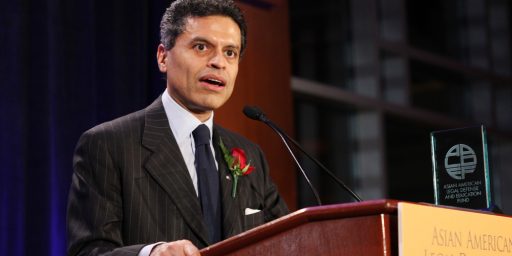Rethinking the Hypocrisy of the Bush Administration
Via Andrew Sullivan comes this essay by Fareed Zakaria, in which he notes “the chasm” between the Bush administration’s democracy rhetoric and its actions. I agree with much of his argument, particularly the section on Vladimir Putin’s “reversal of freedoms.” But the following paragraph deserves closer scrutiny (emphasis added):
High Hopes, Hard Facts (Newsweek)
The president said in his speech to the world’s democrats, “When you stand for your liberty, we will stand with you.†But when democratic Taiwan stood up to communist China last year, Bush publicly admonished it, siding with Beijing. When brave dissidents in Saudi Arabia were jailed for proposing the possibility of a constitutional monarchy in that country, the administration barely mentioned it. Crown Prince Abdullah, who rules one of the eight most repressive countries in the world (according to Freedom House), is one of a handful of leaders to have been invited to the president’s ranch in Crawford, Texas. (The elected leaders of, say, India, France, Turkey and Indonesia have never been accorded this courtesy.) The president has met with and given aid to Islam Karimov, the dictator of Uzbekistan, who presides over one of the nastiest regimes in the world today, far more repressive than Iran’s, to take just one example.
The Bush administration’s Uzbek policy is actually much more complicated than Zakaria suggests. Last July, citing human-rights violations by Tashkent, the State Department withheld $18 million of aid. This move, while financially minimal, prompted even the reliably critical Human Rights Watch to recognize America’s “principled leadership,” especially since the European Union had “been disappointingly weak.” Echoed the Washington Post:
FOR SOME TIME President Bush has been promising to change the long-standing U.S. practice of cultivating dictators in strategically important parts of the world in exchange for their support on security issues or reliable supplies of oil. This week his administration took a significant step in that direction — and in a region where it could have an important impact. The State Department announced that $18 million in military and economic aid to Uzbekistan, a Muslim country in Central Asia, would be suspended because of its failure to carry out a promised political liberalization or improve its human rights record. Driven in part by congressional pressure, the cutoff should send a message to Uzbekistan’s authoritarian president, Islam Karimov, as well as several of his neighbors in a region where oil, gas and military bases have recently become important: The old formula for partnership with Washington may no longer work.
Of course, our Uzbek policy could still use some significant improvements. But it isn’t as hopeless as Zakaria seems to indicate.





Is it as hopeless as our Cuba policy?
It is ironic that the administration that uses devices such as “free speech zones” and loyalty oaths to keep events involving the president free of any hint of dissent should give so much lip service to freedom.
And yes, the dems have used the free speech zone tatic as well. Shame on them.